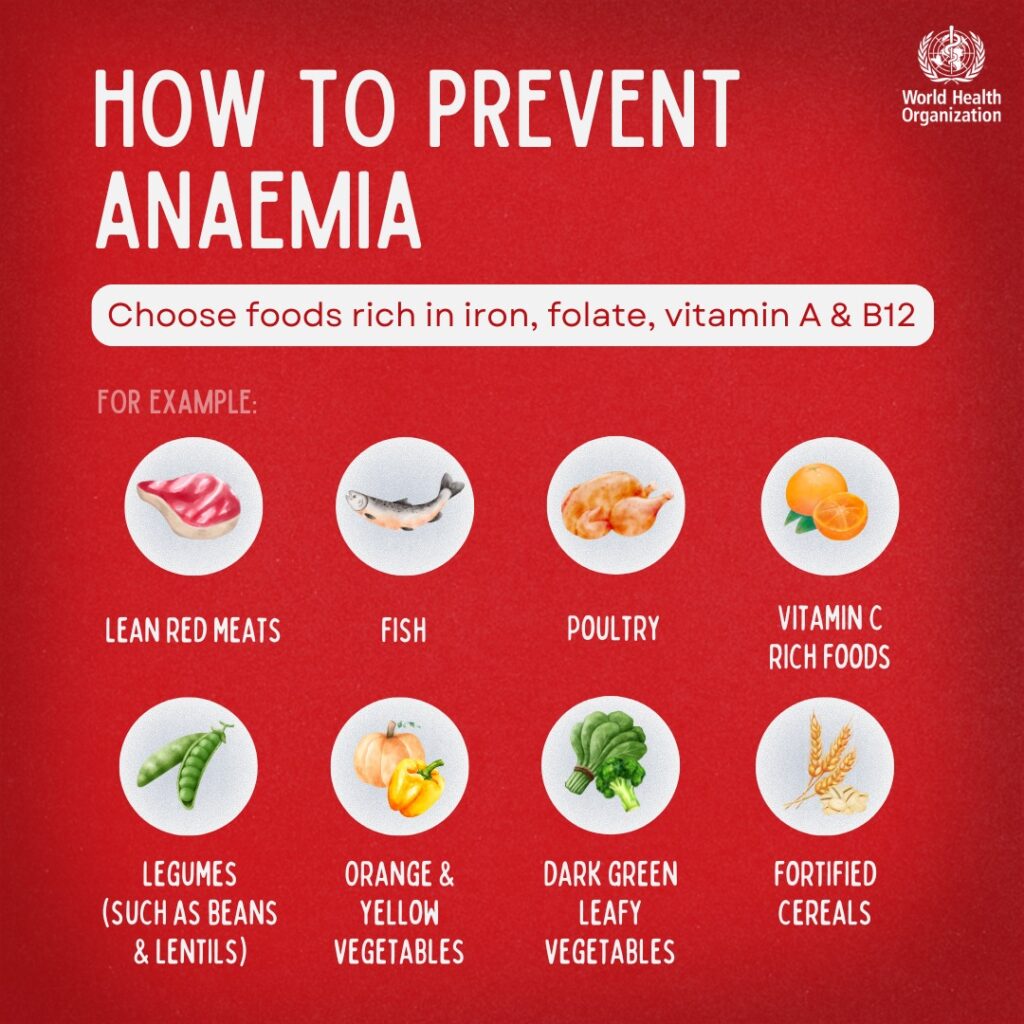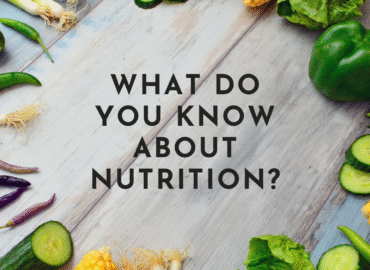- You have no items in your shopping cart
- Continue Shopping
Tips to Prevent Anaemia: Choose Foods Rich in Iron, Folate, Vitamin B6, and B12 – Anaemia is a common health condition that occurs when your body lacks enough healthy red blood cells to carry adequate oxygen to your tissues. One of the most effective ways to prevent anaemia is through a balanced diet rich in key nutrients like iron, folate, vitamin B6, and vitamin B12. These vitamins and minerals play a critical role in red blood cell production and overall blood health.
In this article, we will explore the causes of anaemia, its symptoms, and, most importantly, practical dietary tips to help you prevent anaemia naturally.
What Is Anaemia?
Anaemia affects millions of people worldwide, especially women, children, and individuals with chronic diseases. The most common type is iron-deficiency anaemia, but it can also be caused by deficiencies in folate (vitamin B9), vitamin B6, and vitamin B12.
Common symptoms include:
- Fatigue or weakness
- Pale or yellowish skin
- Shortness of breath
- Dizziness or light-headedness
- Cold hands and feet
- Irregular heartbeat
The good news is that many types of anaemia can be prevented or managed with proper nutrition.

1. Iron: The Building Block of Hemoglobin
Iron is essential for producing hemoglobin, the protein in red blood cells that carries oxygen throughout the body. Low iron intake or absorption can lead to iron-deficiency anaemia.
Foods Rich in Iron
- Red Meat: Beef and lamb are excellent sources of heme iron, the type most easily absorbed by your body.
- Poultry and Fish: Chicken, turkey, and sardines also provide good amounts of heme iron.
- Leafy Greens: Spinach, kale, and Swiss chard are great plant-based iron sources.
- Legumes: Lentils, chickpeas, and beans offer non-heme iron for vegetarians.
- Fortified Foods: Many cereals and grains are fortified with iron.
- Pumpkin Seeds and Nuts: These are great snacks that contribute to your daily iron intake.
Pro Tip:
Consume vitamin C-rich foods like oranges, strawberries, or bell peppers alongside plant-based iron sources to enhance absorption.
2. Folate (Vitamin B9): Essential for DNA and Cell Growth
Folate is critical for producing red and white blood cells in the bone marrow. A deficiency can lead to megaloblastic anaemia, where red blood cells are abnormally large and poorly formed.
Foods Rich in Folate
- Dark Green Vegetables: Broccoli, spinach, and asparagus are folate powerhouses.
- Citrus Fruits: Oranges, lemons, and grapefruits offer natural folate.
- Legumes: Black beans, lentils, and peas are excellent sources.
- Avocados: One of the most folate-rich fruits.
- Fortified Grains: Look for folic acid-fortified bread, pasta, and cereals.
Recommended Intake:
Adults need 400 mcg of folate daily, and pregnant women need 600 mcg to prevent neural tube defects and anaemia.
3. Vitamin B6: Supports Hemoglobin Production
Vitamin B6 plays a role in the production of hemoglobin and helps the body use and store energy from protein and carbohydrates in food.
Foods High in Vitamin B6
- Poultry: Chicken and turkey are rich sources.
- Fish: Tuna and salmon provide high levels of B6.
- Bananas: A convenient, nutrient-rich snack.
- Fortified Cereals: A quick breakfast option to meet your daily needs.
- Potatoes: Especially with the skin on, they offer a decent amount of B6.
Daily Needs:
Most adults require about 1.3–1.7 mg of vitamin B6 per day, depending on age and gender.
4. Vitamin B12: Crucial for Red Blood Cell Formation
Vitamin B12 is essential for healthy nerve function and the production of DNA and red blood cells. A deficiency in B12 can also result in megaloblastic anaemia.
Top Sources of Vitamin B12
- Animal Products: Beef liver, red meat, poultry, eggs, and dairy are the richest sources.
- Fish and Shellfish: Salmon, trout, clams, and sardines.
- Fortified Foods: Nutritional yeast and fortified non-dairy milk or cereals for vegans.
Vegans and Vegetarians:
Since B12 is mostly found in animal products, it’s crucial for vegans to take supplements or consume fortified foods regularly.
5. Combine Nutrients for Maximum Effect
To get the most out of your diet:
- Pair Iron with Vitamin C: Boost absorption of plant-based iron.
- Avoid Calcium with Iron-Rich Meals: Calcium can inhibit iron absorption, so take calcium supplements at a different time.
- Eat a Balanced Plate: Include protein, whole grains, and a variety of colorful fruits and vegetables.
6. Consider Supplements if Needed
While food is the best source of nutrients, sometimes supplements may be necessary, especially if you have:
- A diagnosed deficiency
- Heavy menstrual periods
- Gastrointestinal disorders (like celiac or Crohn’s disease)
- Pregnancy or are breastfeeding
- A vegan or vegetarian diet
Always consult your doctor before starting any supplement regimen.
7. Hydration and Healthy Digestion Matter Too
A well-functioning digestive system helps your body absorb iron and other nutrients more efficiently. Stay hydrated, include fiber-rich foods, and avoid excessive caffeine or alcohol, which can interfere with nutrient absorption.
Conclusion: Eat Smart, Stay Energized
Anaemia is a serious condition that can greatly affect your energy levels, cognitive function, and quality of life. However, by making smart food choices rich in iron, folate, vitamin B6, and vitamin B12, you can greatly reduce your risk of developing anaemia.
Quick Takeaway:
| Nutrient | Key Food Sources | Function in Anaemia Prevention |
|---|---|---|
| Iron | Red meat, beans, spinach, fortified cereals | Forms hemoglobin and carries oxygen |
| Folate (B9) | Leafy greens, citrus fruits, legumes | Helps in red blood cell production |
| Vitamin B6 | Poultry, bananas, fortified grains | Supports hemoglobin and energy metabolism |
| Vitamin B12 | Meat, dairy, fortified plant-based products | Essential for red blood cell formation |
Adopt a nutrient-dense diet and stay proactive about your health. A little awareness today can prevent major health complications tomorrow.
Fern Activ is a comprehensive multivitamin supplement designed to support energy production, immune function, and overall wellness. It combines essential vitamins and minerals to help individuals maintain optimal health, particularly those with active lifestyles or increased nutritional needs.

Key Ingredients and Their Benefits
- B-Vitamins (B1, B2, B6, B12): These vitamins play a crucial role in energy metabolism, converting food into energy, and supporting nerve function.
- Vitamin C (Sodium Ascorbate): A non-acidic form of vitamin C that supports immune health and acts as an antioxidant.
- Vitamin D3 (Cholecalciferol): Essential for bone health and muscle function, vitamin D3 aids in calcium absorption.
- Calcium: Vital for maintaining strong bones and teeth, and it plays a role in muscle contractions and nerve signaling.
- Zinc: An essential mineral that supports immune function and contributes to energy metabolism.
Benefits of Fern Activ
- Energy Support: The B-vitamin complex aids in converting carbohydrates, proteins, and fats into usable energy, helping to reduce fatigue and support physical performance.
- Immune System Enhancement: Vitamins C and D3, along with zinc, work synergistically to bolster the body’s defense mechanisms against infections.
- Bone and Muscle Health: Calcium and vitamin D3 contribute to maintaining bone density and muscle strength, reducing the risk of osteoporosis and muscle weakness.
- Nervous System Support: B-vitamins, particularly B6 and B12, are essential for nerve health and cognitive function, potentially improving mental clarity and mood.
Usage Recommendations
For optimal results, it is recommended to take one capsule of Fern Activ daily, preferably with a meal, or as directed by a healthcare professional. Order now and go to the shop section of this website, thank you.

